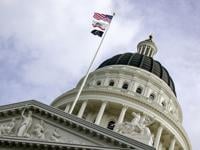
U.S. Supreme Court Justice Brett Kavanaugh
Saying California state officials have essentially argued out of both sides of their mouths, the U.S. Supreme Court has given a green light to oil and gas producers and retailers to sue the state for illegally using the state's special emissions control privileges to attempt to destroy the market for gas-powered cars, not just in California, but nationwide.
On June 20, the high court ruled 7-2 that lower courts were wrong to rule the fuel producers, whose businesses rely on the ability to sell their products to people driving cars powered by petroleum, were little more than "unaffected bystanders," who should not have the ability to sue to block California from using a special federal waiver to implement the state's stringent emissions standards California has said are designed to force the replacement of internal combustion engines with electric vehicles in the name of fighting "climate change."
"The government generally may not target a business or industry through stringent and allegedly unlawful regulation, and then evade the resulting lawsuits by claiming that the targets of its regulation should be locked out of court as unaffected bystanders," wrote U.S. Supreme Court Justice Brett Kavanaugh in the majority opinion.
Kavanaugh was joined in the opinion by Chief Justice John Roberts and justices Clarence Thomas, Elena Kagan, Samuel Alito, Neil Gorsuch and Amy Coney Barrett.
The court's two most liberal members, justices Ketanji Brown Jackson and Sonia Sotomayor, dissented.
The decision means the coalition of oil and gas companies, including a subsidiary of energy company Valero; gas station trade group the National Association of Convenience Stores; and others, can resume their legal action challenging California's so-called "Advanced Clean Cars" program.
The program slaps stringent regulations on automobiles sold in California, seeking to eventually force every vehicle sold in the state to be "zero emission" by 2035. California officials have said the program is intended to push consumers to replace internal combustion powered vehicles with electric cars.
The state is implementing the emissions standards under a special waiver granted by the U.S. Environmental Protection Agency under the federal Clean Air Act, giving California special permission to set emissions standards for their state that are more strict than those imposed by the EPA under federal law.
Those waivers have been granted and renewed, for the most part, since the 1960s, under the reasoning that California's unique geography and other characteristics meant the state also suffered unique smog and other pollution problems.
In the decades since, however, other states have been given the opportunity to either abide by federal tailpipe emissions standards or adopt rules matching California's. To date, 17 other states and the District of Columbia have adopted California's emissions standards and goals. Those states include Colorado, Nevada, New York, New Jersey, Washington, Oregon and Pennsylvania, among others, covering at least 40% of the U.S. population.
Further, as California's economy and population has grown, its market size relative to the rest of the country has essentially allowed California the outsized power to set vehicle emission standards for the rest of the country, and much of the world.

From left, California Gavin Newsom and California Attorney General Rob Bonta
Automakers would neither make vehicles that would be unique to California, but neither would they willingly surrender the ability to sell cars in the Golden State's massive markets.
In more recent years, California's outsized environmental power has become a flashpoint in politics and in the courts, particularly as California has become increasingly hostile to the use of so-called fossil fuels in general.
The state's Democratic leadership clashed with President Donald Trump during his first term in 2019 over Trump's attempt to rescind the waiver.
Then, after President Joe Biden reinstated the waiver, the energy companies sued in 2022, seeking to secure a court declaration that the waiver itself is illegal, because California and its 17 allied states are not using the waiver to address local pollution issues, but to impose their anti-oil rules and philosophy across the U.S., all but putting oil and gas companies out of business through force of law.
The lawsuit was not aimed at California directly, but rather at the U.S. EPA. California and its allied states, however, intervened in the matter, asserting they needed to be given the chance to defend their waiver.
In that request, the state said it needed to defend the waiver because the waiver is needed to boost the state's efforts to push a transition to electric vehicles and combat "climate change."
However, once they were granted permission to defend the waiver, the state immediately pivoted, claiming the energy companies had no right to sue because the market itself was driving the transition to electric vehicles, so the waiver and California's regulations don't harm the companies.
The D.C. Circuit Court of Appeals sided with California, dismissing the energy companies' lawsuit because the court agreed the companies can't show they will be harmed by the state's goal of eliminating internal combustion engine emissions by 2035.
The energy companies appealed to the Supreme Court, which agreed to take up the case on the narrow question of whether the oil and gas companies had legal standing to sue over the California waiver.
In the June 20 ruling, the Supreme Court majority agreed they could sue.
In the majority opinion, Justice Kavanaugh noted California's seemingly conflicting arguments over the waiver and the companies' ability to sue, noting the state first asserted in 2021 and 2022 that its regulations are needed to reduce oil and gas consumption and the resulting emissions now and in the future, but then telling the Appeals Court and Supreme Court in more recent months that its regulations will have no real impact on the business of the companies that make the oil and gas products California is seeking to reduce or eliminate.
"EPA and California continue to enforce these regulations, and for three years, EPA and California have tenaciously defended them in court," Kavanaugh wrote. "So it is difficult to put much stock in their suggestion that invalidating the regulations (in California and 17 other States) would have zero effect on the new vehicle market in America both now and in the future.
"Simply put, EPA’s and California’s own actions—their statements, their enforcement decisions, their litigation positions—undermine the central premise of their ... argument. When as here a government seeks to justify its regulatory actions by, on the one hand, touting the consequences for fuel usage and emissions while, on the other, maintaining that those same regulations are unreviewable because there are no consequences, courts can appropriately be skeptical."
Kavanaugh and the majority agreed with the energy companies that it was obvious that California's stringent emissions regulations and associated electric car mandates could harm the oil and gas industry, essentially using emissions regulations on the auto industry under the EPA waiver to accomplish the otherwise impossible goal of banning the use of petroleum-powered vehicles.
Kavanaugh and the majority said the law does not allow California to set standards that would indirectly but sharply limit a legal industry's ability to do business, and then use equally stringent pleading standard to block those companies out of court in an attempt to redress what they believe to be an illegal government action.
In dissent, Sotomayor asserted the court didn't need to rule on the matter now, but merely needed to essentially clarify the questions and scope and send it back to the D.C. Court of Appeals for more proceedings.
Jackson, however, assailed her colleagues, asserting they were biased in favor of "moneyed interests" when deciding questions of standing.
She asserted, like California and the D.C. Circuit, that the fuel producers can't show for certain regulations sharply limiting the use of their products would actually hurt their businesses and ability to compete in a free market.
Jackson backed California's arguments that carmakers are already shifting to electric vehicle production - even if as a result of prior government regulation and incentives - so the market was hurting oil and gas companies, not the state's stringent regulations.
And Jackson asserted the court should have avoided ruling in the case, because the oil and gas companies' lawsuit could be soon rendered moot by a new court fight between California and the Trump administration over efforts by the White House and Congress to strip California of its EPA waiver for good.
California Attorney General Rob Bonta and Gov. Gavin Newsom indicated they would argue their waivers belong to the state by right under the Clean Air Act and cannot be removed by either the President nor Congress using a federal law empowering Congress to review and undo federal regulations.
In earlier court filings, California has also argued the waiver cannot be rescinded by the EPA.








